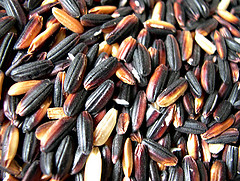I mentioned a few days ago that the water hyacinth is making a comeback on Lake Victoria, after being almost eradicated by biological control. That’s sparked a small-scale furniture-making industry, but is obviously bad news for fishermen, who are forced to venture further out into the lake to get good catches. That’s far more than just a nuisance, according to an article in The Nation today. The further you go out from shore, it seems, the greater the danger of falling foul of pirates! The veritable heart of darkness that is the nile perch fishery on Lake Victoria is the subject of a very well-reviewed documentary, “Darwin’s Nightmare,” which I hope to see soon. Have you?
Thai rice on the genebank menu
 There was a slightly odd article at Seed Magazine a little while back on Thailand’s efforts to conserve almost extinct varieties of rice in its genebank. Odd because while the story is familiar enough in this kind of piece, the details are slightly confused (or confusing). But no matter, that’s probably only of concern to a pedant like me. The rest of you won’t worry about statements like “farmers across Asia once grew more than 100 varieties of rice, but now that number is down to only 20 or 30 of the most productive types”. Instead, you’ll be thrilled to know that the Thai national collection houses nearly 24,000 varieties, 17,000 of which “are in danger of dying out because they are no longer grown by Thai farmers”. That’s great because SINGER, a window on the world of genebank accessions, lists only 5982 samples from Thailand. Maybe one of those is “the fragrant Pin Kaew variety that was named the best rice in the world at a competition in 1966 but which has since disappeared, having lost out to more productive varieties”.
There was a slightly odd article at Seed Magazine a little while back on Thailand’s efforts to conserve almost extinct varieties of rice in its genebank. Odd because while the story is familiar enough in this kind of piece, the details are slightly confused (or confusing). But no matter, that’s probably only of concern to a pedant like me. The rest of you won’t worry about statements like “farmers across Asia once grew more than 100 varieties of rice, but now that number is down to only 20 or 30 of the most productive types”. Instead, you’ll be thrilled to know that the Thai national collection houses nearly 24,000 varieties, 17,000 of which “are in danger of dying out because they are no longer grown by Thai farmers”. That’s great because SINGER, a window on the world of genebank accessions, lists only 5982 samples from Thailand. Maybe one of those is “the fragrant Pin Kaew variety that was named the best rice in the world at a competition in 1966 but which has since disappeared, having lost out to more productive varieties”.
flickr photo by Stef Noble used under a Creative Commons license. Purple Sticky Rice is rare, but not that rare.
Rice stories
The BBC World Service is broadcasting a series of four programmes on the rice cultures of Asia, called Rice Bowl Tales. Starts 28 February, but if you miss it, it seems like the series has already aired on Radio National, and if you follow the link I’ve just given, you should be able to listen online or download audio files.
Chocolate from tree to cup
In honour of Valentine’s Day, albeit a day late, a chocolate-flavoured post today. First, from the great Howstuffworks, How Chocolate Works. Then, ever wondered where you can get the best hot chocolate in New York or Paris? Well, wonder no longer, and check this out. And finally, news that a network has been established to conserve cacao diversity. You can read the Bioversity International press release here.
Dual-purpose weeds
Two stories today about different ways of looking at the same plant. I was walking along a fairly major road in a suburb of Nairobi this morning and I noticed a “jua kali” artisan selling interesting-looking stuff. “Jua kali” is Kiswahili for “under the sun” and is commonly used hereabouts to refer to the informal sector, because under the sun is where most of them transact their business, as in this case. Anyway, I ended up buying the magazine rack pictured here, for about US$15.
The frame is metal, but the rest is made of a tough-looking fibre I couldn’t place. I asked what it was and was very surprised to hear that it is water hyacinth. That’s a very cool use for a noxious weed, which is again choking up Lake Victoria, after a successful biological control effort. It turns out that making furniture out of the stuff is not all that uncommon.
And here’s the story of the mesquite bush in Kenya, a useful plant in some parts of the world (even used as food in some cultures), but seen as a terrible invasive here, in particular by pastoralists in the drier areas of the country. But I bet people are working on novel, profitable uses. Maybe someone in northern Kenya is already marketing mesquite honey, or carvings made of mesquite wood?